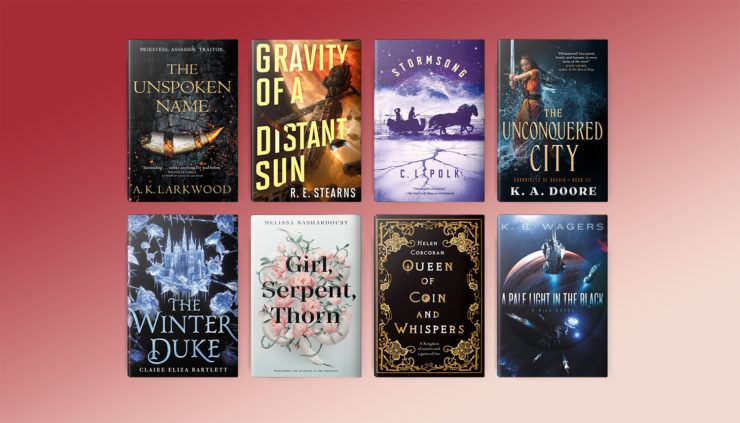Sometimes I wonder about how outdated the description of this column has become. It screws with my head to realise I’ve been writing here for going on eight years now, through what feels like a cultural sea-change. (The “death” of the blog. The rise of global right-wing extremism. The spread of equal marriage. The—outspoken, enthusiastic—queering of written SFF. The anti-racist work that people of colour have done to drag the SFF community kicking and screaming into being a more welcoming place.) Sleeps With Monsters, as a column/body-of-work hasn’t only been about women and their work for years, though the column description hasn’t changed.
These days, my personal interests—and thus, almost inevitably, the focus of my columns—lie more in the intersection of women, queerness, and SFF, not excluding genderqueerness. Over the past eight years, it has become possible to have a focus on women and queerness in SFF that doesn’t rely on subtext and secondary characters to find more than a handful of works to dig into. (Though it’s important to remember that people like Nicola Griffith and Melissa Scott were writing novels with queer women for mainstream SFF publishers in the 1990s—they still are—and there are examples from the 1980s and 1970s even if you leave Joanna Russ aside: history matters. History’s what gives us a foundation to build on.) It feels meaningful to me that this development in the fiction I was reading occurred alongside my realisation of my bisexuality and genderqueerness: one of those coincidences of timing that almost certainly sped up my self-knowledge in one respect, if not others.
The portrayal of queerness, and of queer women, matters. It remains a double marginalisation, despite all the work that has been done: a combination that adds complicating factors to other marginalisations in the world. Its normalisation through fiction is one of the things that persists in giving me hope in the face of the increasingly bleak picture of international politics of my adulthood. At its best, SFF with queer protagonists and sensibilities is capable of interrogating the conservative wallpaper of the genre through different eyes: the monarchies and empires, the restoration-of-a-golden-age, the primacy-of-bloodline, the chosen-saviour-hero bent that retains a seductively common presence in so many narratives.
At its best, it’s also very entertaining.
I’m looking forward to seeing what a number of books do in 2020, but here’s a few that I’m damn sure will hit the “highly entertaining” marks:
- C.L. Polk’s Stormsong, a sequel—of sorts—to Witchmark, starring a politically ambitious young woman and an intrepid reporter.
- A.K. Larkwood’s The Unspoken Name: Combines fantasy, SFnal sensibilities, archaeology and a relationship that looks utterly doomed until it isn’t.
- R.E. Stearns’ Gravity of a Distant Sun: Pirate lesbian engineers on the run from murderous AIs get arrested. Escape. Shenanigans.
- K.B. Wagers’ A Pale Light in the Black: Science fiction SPORTS.
- Helen Corcoran’s Queen of Coin and Whispers: bless the protagonists’ hearts, they’re young and trying really hard not to be Dramatic.
- Claire Eliza Bartlett’s The Winter Duke: I haven’t read so much as an extract but the description is so much MY CRACK I don’t think I need to?
- Melissa Bashardoust’s Girl, Serpent, Thorn: I heard of this via Tasha Suri (Realm of Ash, etc) and honestly it sounds pretty great.
- K.A. Doore’s The Unconquered City: I am all-in for Doore’s queer adventure fantasy.
…And that’s only what I’m prepared to believe will be excellent and queer and vaguely involve queer women that’s coming before July.
I need to catch you guys up on what I’ve been reading—I have some things to recommend quite highly—but if I do that here we’re at risk of reaching tl;dr territory. What have you been reading lately, and what are you looking forward to?
Liz Bourke is a cranky queer person who reads books. She holds a Ph.D in Classics from Trinity College, Dublin. Her first book, Sleeping With Monsters, a collection of reviews and criticism, was published in 2017 by Aqueduct Press. It was a finalist for the 2018 Locus Awards and was nominated for a 2018 Hugo Award in Best Related Work. Find her on Twitter. She supports the work of the Irish Refugee Council, the Transgender Equality Network Ireland, and the Abortion Rights Campaign.










